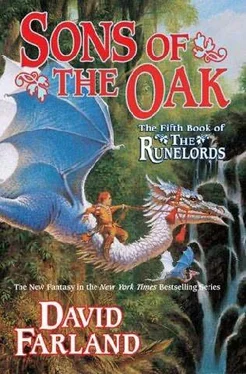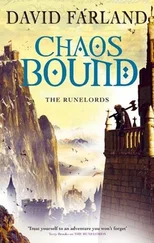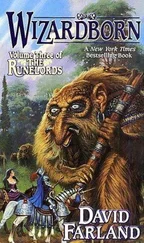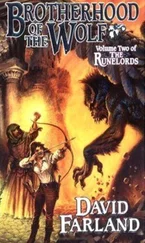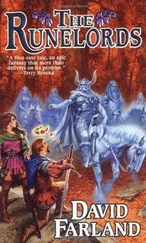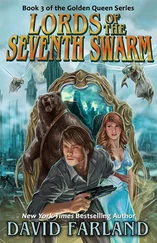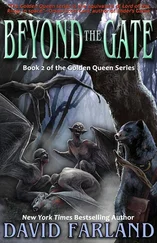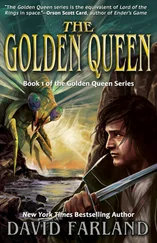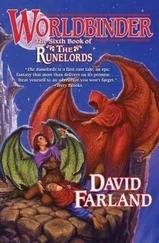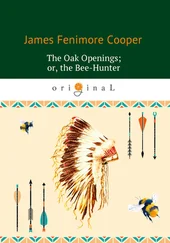David Farland - Sons of the Oak
Здесь есть возможность читать онлайн «David Farland - Sons of the Oak» весь текст электронной книги совершенно бесплатно (целиком полную версию без сокращений). В некоторых случаях можно слушать аудио, скачать через торрент в формате fb2 и присутствует краткое содержание. Жанр: Фэнтези, на английском языке. Описание произведения, (предисловие) а так же отзывы посетителей доступны на портале библиотеки ЛибКат.
- Название:Sons of the Oak
- Автор:
- Жанр:
- Год:неизвестен
- ISBN:нет данных
- Рейтинг книги:5 / 5. Голосов: 1
-
Избранное:Добавить в избранное
- Отзывы:
-
Ваша оценка:
- 100
- 1
- 2
- 3
- 4
- 5
Sons of the Oak: краткое содержание, описание и аннотация
Предлагаем к чтению аннотацию, описание, краткое содержание или предисловие (зависит от того, что написал сам автор книги «Sons of the Oak»). Если вы не нашли необходимую информацию о книге — напишите в комментариях, мы постараемся отыскать её.
Sons of the Oak — читать онлайн бесплатно полную книгу (весь текст) целиком
Ниже представлен текст книги, разбитый по страницам. Система сохранения места последней прочитанной страницы, позволяет с удобством читать онлайн бесплатно книгу «Sons of the Oak», без необходимости каждый раз заново искать на чём Вы остановились. Поставьте закладку, и сможете в любой момент перейти на страницу, на которой закончили чтение.
Интервал:
Закладка:
“You really think this will happen?” Borenson asked.
Fallion turned his face upward. “I’m going to make it happen.”
Borenson drew back in astonishment, unsure whether to believe the boy. But something inside him knew that Fallion was serious. “When?” he asked.
“Soon. A year or two,” Fallion said. “I must return to Mystarria.” He turned and peered into the hearth, and his eyes seemed to fill with fire. “There’s a wizard at the heart of the world, one who seeks to heal it, a woman. I must find her, warn her of the dangers of what she is doing.”
“Averan?” Borenson asked. He’d never told Fallion about the girl, or anyone else for that matter. Gaborn had warned him not to. The work that she was doing was too dangerous, too important.
“So that’s her name,” Fallion said. “She’s the one that made me what Iam…”
The Heir of the Oak, Borenson realized. More perfect than children born in ages past. More like the Bright Ones of the netherworld.
At midwinter, Borenson learned the truth of what had happened at Shadoath’s Keep. A traveler came upriver, bearing news. The children in Shadoath’s Keep had been rescued, and were being given over to loving homes.
Did Borenson want one?
“No, thank you,” Borenson said. “I’ve got more than I can handle as it is.”
But Borenson dug the details from the stranger, and learned the truth of Fallion’s battle: Fallion had faced Shadoath at the height of her power, and had put her down.
Borenson had once wept for the boy’s lost innocence. Now he found himself weeping in gratitude to learn that the boy had retained it.
“He did not repeat my mistakes,” he told himself over and over.
That was something grand.
It was only three weeks later, in early spring, that Fallion solved the mystery of the death of his father.
From the time that they arrived in Sweetgrass, he’d heard rumors that the Earth King was seen in the area mere days before he died.
Back home in Mystarria, Fallion had dared imagine that his father had been murdered by Asgaroth, and that someday he would avenge him.
So Fallion collected rumors of his father’s whereabouts.
He was delivering eggs to the innkeeper in Sweetgrass, a lean man named Tobias Hobbs, when one of the guests at the inn said, “There’s an oak tree growing up on Bald Mountain, not two days’ walk from here.”
“An oak tree?” some stranger asked. “How would you know?”
And Fallion wondered how he would know indeed. There were stonewood trees down by the sea, and white gums along the river, and king’s pine in the mountains, and leatherwood and other types of trees that Fallion couldn’t even name. But there were no oaks in all of Landesfallen, and Fallion himself could barely remember what they looked like. His only real clue was a button that he kept in an old box, a gold button with the face of a man, his hair and beard made up of oak leaves.
“I’m sure. It’s the only one in all of Landesfallen,” the stranger was saying.
And so, on a hunch, two days later Fallion took a pack and followed the river upstream, past the towns of Mill Creek and Fossil, and then turned inland and climbed Bald Mountain.
He reached the top near sundown, and there discovered the oak tree, a young tree with golden bark, new leaves unfolding in green while only a few tattered brown remained from the previous fall, and boughs that spread wide over the ground, as if to shelter the world beneath.
Fallion circled the tree.
They called him a son of the oak, but he had not seen one in so long that he had almost forgotten how beautiful a tree could be.
My father planted this, he thought. He stood here once, just as I am now.
For Fallion, the tree was a thread that bound him to a father he had never really known.
He looked for a place to sit, so that he could just admire it. Nearby was a tall outcropping of red rock, and he thought that he could lean against it, soak in its sun-drenched warmth like a lizard. He walked toward it, saw a vertical slit of blackness that revealed the presence of a tiny cave.
Fallion peered inside and found a weathered pack on the ground, its leather surface blending into the dust. Mice had nibbled at it, tearing a hole.
Upon the back of it, a leather cord acted as a latch, and a single gold button held it closed. Fallion peered at the button. The image of the green man stared back.
My father’s pack.
He opened it, looked inside. There had been food inside once, grain and herbs, but the mice and bugs had gotten to it.
A leather pouch held a portrait with a silver backing and a glass cover. The picture was painted on ivory, and showed Fallion and Jaz as children with their mother and father, all of them painted side by side. The boys could not have been more than four. They all smiled, grinning so innocently at the future.
Fallion marveled at it, for he did not recall having sat for the painting. Hours of his life, wasted, forgotten.
Beneath the painting was a change of clothes, a razor and mirror, a few coins, and an old leather book.
Fallion opened the book, and saw that it was a journal, containing notes about his father’s travels, the people he had met, the things that he had learned, his hopes and dreams and fears. It was a window into the soul of the world’s greatest king.
There in the shadows, Fallion could not read it. He thought to take it outside, and reached out for support as he rose to his knees. By chance he touched a staff, an oaken walking stick with a brass base, nicely carved. Gems were set in the handle, and runes had been carved along its lengths.
The Wizard Binnesman’s work, Fallion realized.
He took the staff and the book out into the bright sunlight and squinted as he peered around.
Father wouldn’t have left these, Fallion told himself. His body will be nearby.
Behind him was all rock, a sheer rise of petrified sand dunes, the stone cascading down as if to make a stairway into the heavens.
Below was the hillside, covered with sparse grasses.
The only place that a body could be hidden was there beneath the tree.
Fallion took the staff and prodded the old leaves beneath the tree. They formed a mat, brown leaves splotched by dark lichens and mold. Many had gone skeletal, showing only the bones of leaves.
There Fallion struck something round and heavy, and a skull rolled out from the leaves, grayed by age, its walls thinning as it decalcified.
“There you are, Father,” Fallion whispered, picking up the skull.
He prodded some more and found a collection of bones, a few thin ribs, finger bones, and a hip. There was no sign of foul play, no dagger protruding from the back, no arrow in the heart. Just bones.
Finally Fallion understood.
Father had been a wizard, an aging wizard. Just as a flameweaver carried an elemental of flame within him, or one of the wind-driven would unleash a cyclone, something of the earth had to make its way out of his father upon his demise.
Fallion peered out over the valley, the land that he called home. From up here, he could see the river snaking through green and peaceful fields, cottages down below with red-and-white cattle or black sheep dotting the fields. There were orchards and hay fields stretching as far as Fallion could see.
Fallion’s father had not been murdered. He had been old and decrepit, dying.
So he sought out a fertile place, and had planted himself there.
He wanted me to be here, Fallion realized. He wanted me to be where he could watch over me.
Fallion had never really known his own father. At times he had wanted Waggit to be his father, or Borenson, or Stalker. And as such children do, he had learned from each of those men, had taken something of them into himself.
Читать дальшеИнтервал:
Закладка:
Похожие книги на «Sons of the Oak»
Представляем Вашему вниманию похожие книги на «Sons of the Oak» списком для выбора. Мы отобрали схожую по названию и смыслу литературу в надежде предоставить читателям больше вариантов отыскать новые, интересные, ещё непрочитанные произведения.
Обсуждение, отзывы о книге «Sons of the Oak» и просто собственные мнения читателей. Оставьте ваши комментарии, напишите, что Вы думаете о произведении, его смысле или главных героях. Укажите что конкретно понравилось, а что нет, и почему Вы так считаете.
